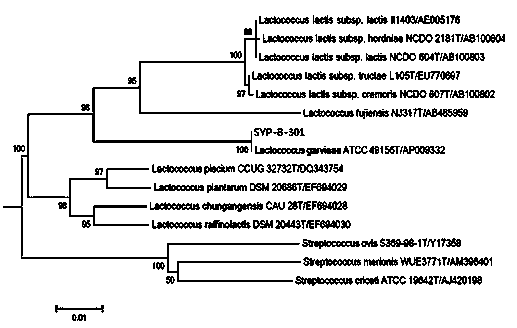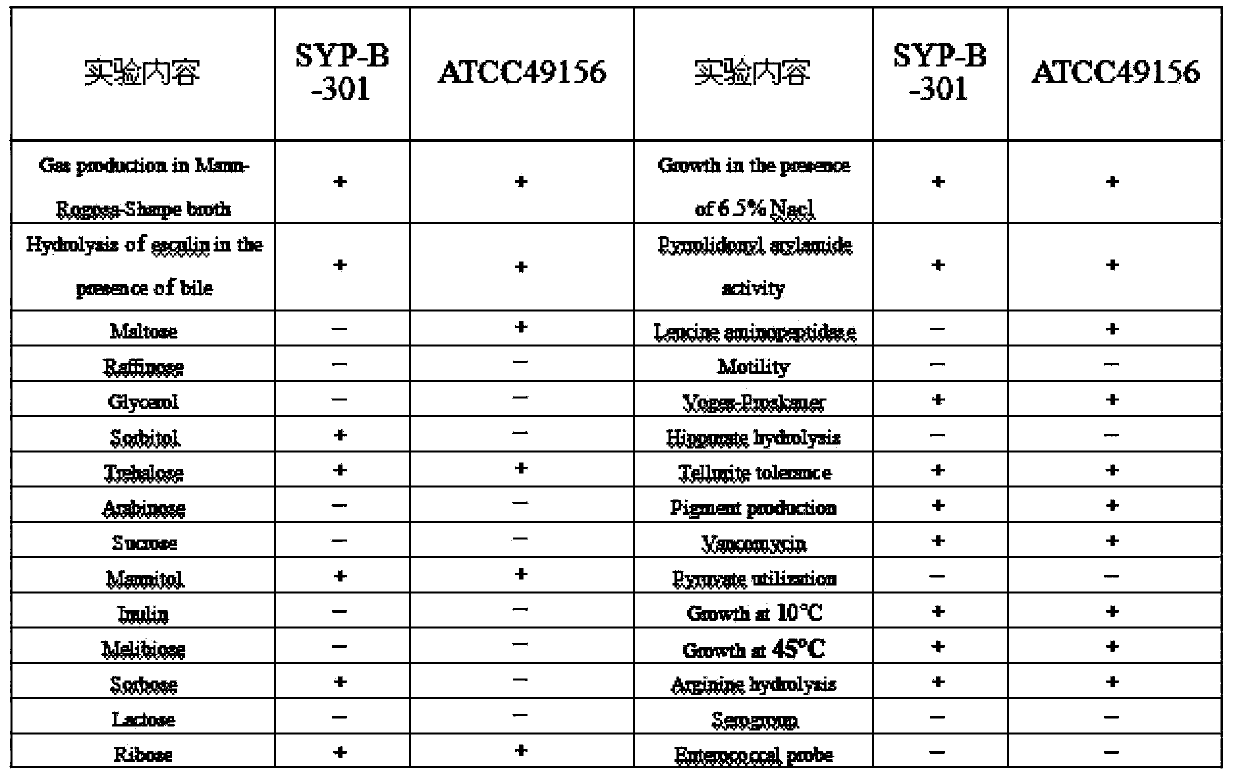Lactococcus garvieae and biological feed-additive prepared therefrom
A feed additive, Lactococcus gasseri technology, applied in the field of microorganisms, can solve the problems of high price, high dosage, complex components, etc., and achieve the effects of reducing feed consumption, promoting growth and good stability
- Summary
- Abstract
- Description
- Claims
- Application Information
AI Technical Summary
Problems solved by technology
Method used
Image
Examples
Embodiment 1
[0017] Embodiment 1: each culture characteristic of bacterial strain SYP-B-301 of the present invention
[0018] After the Lactococcus gasseri SYP-B-301 strain was cultured on the medium at 25-34° C. for 24 hours, the colony morphology was observed, and the plate showed a transparent round colony with a smooth surface and a colony diameter of 1-2 mm. The strain is red after Gram staining, and under a microscope, it is found that the bacteria is a regular spherical shape with a diameter of 0.5-0.8um, no spores, flagella, capsules, no movement, single, paired or short chains.
[0019] Genomic DNA of strain SPY-B-301 was extracted, and PCR was performed with Primer (S): 5'AGA GTT TGA TCC TGG CTC AG3'; and Primer (A): 5'AAG GAG GTG ATC CAG CCG CA3' as primers, Amplify the 16s rDNA gene of the strain. After purification, gene sequencing was carried out, and the measured sequence was compared with the rDNA homologous sequence in Genbank, 15 strains with higher homology were selecte...
Embodiment 2
[0022] Embodiment 2: take mouse as model animal, research the influence of SYP-B-301 feed additive on mouse growth performance
[0023] Experimental animals: 20 Kunming male mice (about four weeks old) of 18-22 g were selected, and the test period was 15 days. Divide into control group and experimental group, each group has 10 experimental mice, and repeat the experiment twice.
[0024] Weigh every day from the beginning of the test, take each repetition as a unit, calculate the average daily weight gain of each group, and accurately record the feed intake and the amount of leftover material, observe the mental state of the mice in each group, the test period is 15d, calculate the average daily weight gain Weight gain, and accurately record the feed intake and leftover feed amount, calculate the average daily feed intake and feed conversion ratio of each group, and record the mortality rate and diarrhea rate. The experimental results are shown in Table 2.
[0025] Animal exp...
Embodiment 3
[0039] Embodiment 3: take weaned piglet as model animal, research the influence of SYP-B-301 feed additive on growth performance of weaned piglet
[0040] Select 28-day-old weaned piglets and randomly divide them into 2 treatments according to litter source, body weight, and sex. Each treatment has 6 replicates, and each replicate has 6-8 pigs. The male-to-female ratio is balanced. It started at about 56 days old and lasted for 28 days, ending at 56 days old.
[0041] Piglets were weighed on an empty stomach at 8:00 am at 28 days, 42 days and 56 days respectively, and the feed consumption at this stage was settled on the day of weighing. The average daily feed intake, average daily gain, feed-to-weight ratio, mortality rate and diarrhea rate of piglets at each stage were calculated.
[0042] The weight of the piglets was weighed at the beginning and end of the test, carried out on an empty stomach in the morning, the feeding trough of the piglets was cleaned up 12 hours before ...
PUM
 Login to View More
Login to View More Abstract
Description
Claims
Application Information
 Login to View More
Login to View More - R&D
- Intellectual Property
- Life Sciences
- Materials
- Tech Scout
- Unparalleled Data Quality
- Higher Quality Content
- 60% Fewer Hallucinations
Browse by: Latest US Patents, China's latest patents, Technical Efficacy Thesaurus, Application Domain, Technology Topic, Popular Technical Reports.
© 2025 PatSnap. All rights reserved.Legal|Privacy policy|Modern Slavery Act Transparency Statement|Sitemap|About US| Contact US: help@patsnap.com



